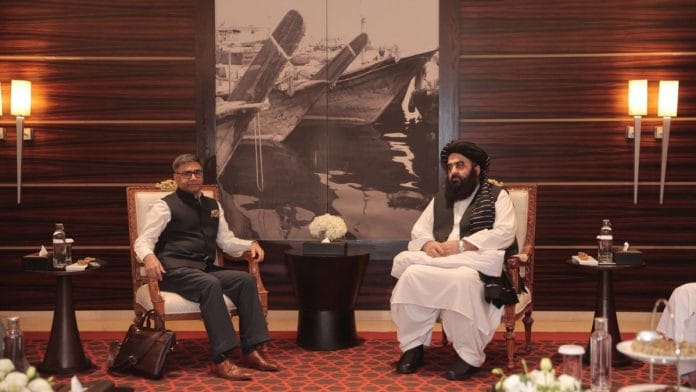New Delhi: The Taliban Saturday strongly rejected Pakistan’s claims of a missile attack on Afghanistan, a claim that was also denied by Foreign Secretary Vikram Misri during a special briefing earlier in the day.
Speaking to Hurriyat Radio, a local media house in Afghanistan, Taliban defence ministry spokesperson Inayatullah Khwarizmi said that “there is no truth to the claims” regarding India targeting the Central Asian country with missiles.
State-backed Pakistani TV channels propagated these claims, and they were further amplified across social media as part of Islamabad’s media strategy. There was no evidence or local news reporting emanating from Afghanistan to back the assertions made by Pakistani channels.
“There is this, yet again, completely ludicrous claim that Indian missiles have hit Afghanistan. Totally frivolous allegation, and I only want to point out that Afghan people don’t need to be reminded about which country it is that has, on multiple occasions in just the last one and a half years, targeted civilian populations and civilian infrastructure in Afghanistan,” Misri said Saturday morning during a special briefing on India’s Operation Sindoor.
#WATCH | #OperationSindoor | Foreign Secretary Vikram Misri says, "There is this yet again completely ludicrous claim that Indian mailers have hit Afghanistan totally frivolous allegation and I only want to point out that Afghan people don't need to be reminded about which… pic.twitter.com/GX1LStuBpq
— ANI (@ANI) May 10, 2025
The claims emanating from Pakistan came as Islamabad launched Operation Bunyan un Marsoos, targeting Indian civilian sites and military infrastructure across the Line of Control and the International Boundary. Islamabad’s response to Operation Sindoor has done limited damage to equipment and personnel at Indian Air Force stations at Udhampur, Pathankot, Adhampur, and Bhuj.
“Pakistani claims about activities that they have undertaken continue to be heavy on lies, misinformation and propaganda. And on top of that, this is peddled by Pakistani state agencies,” Misri said.
Also read: Controversial Pakistani firm BSI removed as partner from US satellite company’s website
Pakistan’s own strikes in Afghanistan
On 7 May, India launched Operation Sindoor, striking at nine terrorist complexes inside Pakistan and Pakistan Occupied Kashmir. The operation was carried out following the terrorist attack in Jammu and Kashmir’s Pahalgam, which left 26 tourists dead, including 25 Indians and one foreign national, on 22 April.
While Pakistan has tried to drag Afghanistan into the current situation, Islamabad in the last year and a half has conducted actual air strikes inside Afghanistan. In December 2024, airstrikes launched by Pakistan’s military killed at least 46 civilians in Afghanistan, according to the Taliban.
The Taliban had claimed that the attack constituted a violation of its sovereignty. At the time, India condemned the attack. Days later, the Taliban claimed to have targeted several points in Pakistan.
The Taliban regime claimed that a number of “malicious elements” who organised “coordinated attacks” against Afghanistan were struck by its security forces. The back and forth occurred as ties between the Taliban and Pakistan were strained after Islamabad claimed that a number of terrorist attacks emanated from across the Durand Line.
In March 2024, Pakistan carried out two air strikes in the eastern Afghan provinces of Khost and Paktika, killing five women and three children, according to the Taliban. The strike came days after unknown individuals attacked a military post in Pakistan.
India has stepped up its outreach with the Taliban, which returned to power in Afghanistan in 2021. In January this year, Misri met with Acting Minister of Foreign Affairs Mawlawi Amir Khan Muttaqi for the first time in Dubai.
More recently, after the terrorist attack in Pahalgam, Anand Prakash, Director General of the Afghanistan, Pakistan, and Iran Division in India’s Ministry of External Affairs, met Muttaqi in Kabul.
(Edited by Prasanna Bachchhav)
Also read: After Pahalgam, Modi govt took the 1971 playbook — and went several steps further






